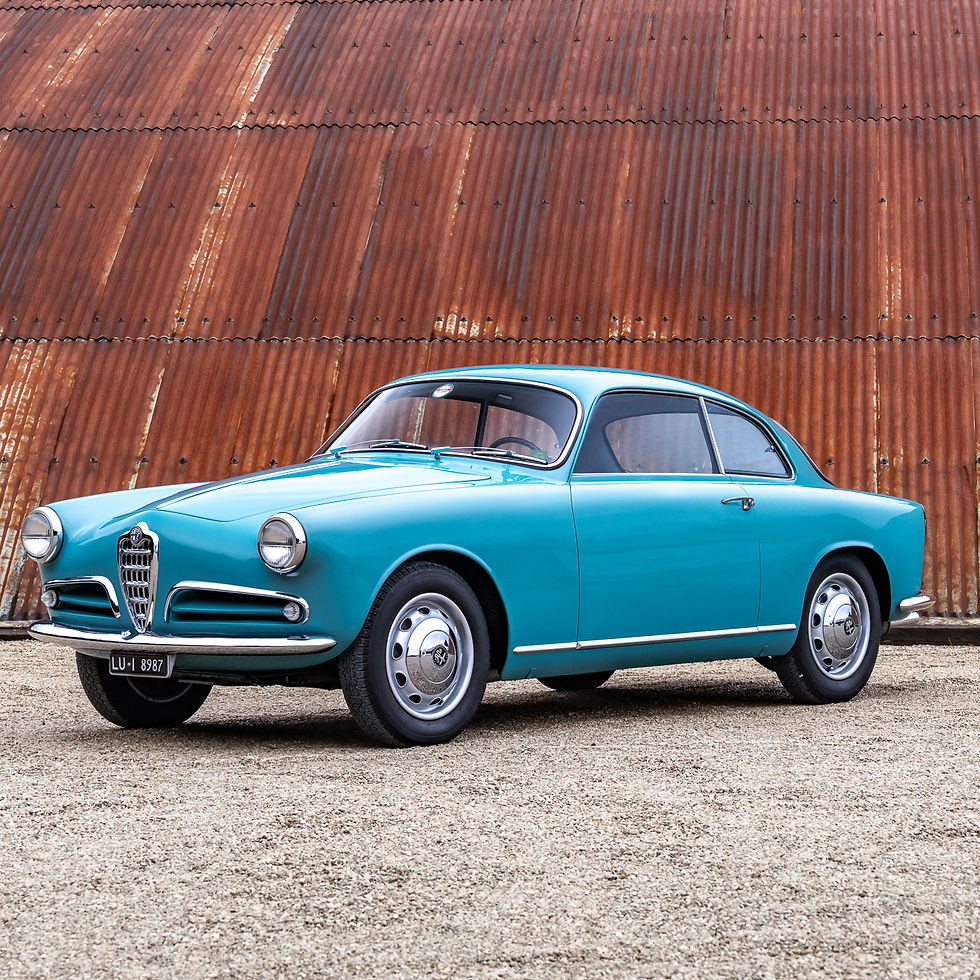Beautifully presented in Midnight Blue, this Aston Martin DB5 Convertible has benefitted from an extensive programme of works carried out by Aston Workshop and Aston Martin Works at Newport Pagnell.
Chassis number DB5C/1269/R was sold new to a Mr Roy James McAuliffe and was specified with the Borg Warner automatic gearbox – one of only 59 DB5 Convertibles to be so equipped. In 1978, the car was acquired by the Hitchins family of Cheltenham who would own the car for the next 34 years before selling to the current owner.
Since being acquired by the present owner it can truly be said that no expense has been spared to restore the car. In 2012 chassis 1269R was sent to the Aston Workshop in Beamish County Durham where a comprehensive programme of works was commissioned to mechanically restore the car. The engine was uprated with a new crankcase and crank to 4.7 litres, the original crankcase is with the car. In addition, the gearbox was converted to four-speed automatic for effortless distance cruising. Furthermore, the suspension was uprated and the braking system improved for better road holding and stopping performance. Electronic power steering was fitted to make the car enjoyable even at low speeds and when manoeuvring. In short, the entire drive train and running gear were comprehensively restored. At this time Inertia seat belts were also fitted and a Becker Indianapolis iPhone compatible stereo system was installed. Such was the extent of mechanical restoration that the car took over 18 months to be completed ready for the Holy Land tour in 2015.
After a trouble-free tour, the car was delivered back to the factory it was made in some 50 years previously. Aston Martin Works in Newport Pagnell lavished a 2-year cosmetic restoration on the car in 2016. The invoices and detailed pictures are available in the history file and make for impressive reading. In total over a quarter of a million pounds was spent on taking the coachwork back to bare metal, the interior and hood were stripped and have been re-upholstered. Air conditioning was fitted and the exterior colour was changed to midnight blue metallic while the interior was beautifully retrimmed with Connolly fawn hide and corresponding ever-flex hood. In short, the car has had every conceivable expense bestowed upon it by leading Aston Martin restorers and now surpasses its original specification in terms of condition, performance and reliability.
The huge amount of work that was carried out at Newport Pagnell is painstakingly recorded in the car’s history file, right down to the smallest nuts and bolts, with a photographic record detailing every stage.
The invoices totalling almost £400,000 over nearly five years are testament to the quality of care and dedication that has been put in to this car to make it an exceptional example of the Aston Martin DB5 Convertible. Now being offered for sale at The Classic Motor Hub for only the second time in 45 years, this is a great opportunity to acquire one of the most stylish and desirable GT cars ever built.
MODEL HISTORY
Launched at the 1963 Frankfurt Motor Show, the Aston Martin DB5 was – visually, at least – largely indistinguishable from the outgoing DB4 Series 5. It retained that car’s Superleggera method of lightweight construction but there were numerous refinements and updates beneath the Touring-designed bodywork.
Most significantly, Tadek Marek’s twin-cam, six-cylinder engine had been bored-out from 3670cc to 3995cc. A five-speed gearbox soon replaced the old four-speeder, and a Borg Warner automatic transmission was also offered.
When Autocar tested a DB5 in September 1964, it recorded a top speed of 142mph and a 0-60mph time of 8.1 seconds. It also noted how easily and comfortably the DB5 would cruise at speeds in excess of 100mph and concluded that it ‘ranks in the very top bracket of the world’s high-performance cars.’
Motor magazine added that ‘the rack and pinion steering is very positive and precise… as with all good thoroughbreds, response is immediate and the car can be guided through fast corners with great accuracy.’
The majority of DB5s were coupés, but Aston Martin also built 123 Convertibles – the company didn’t use the Volante name until the soft-top DB6 was introduced.
Torsional rigidity on the open model was improved by strengthening the sills and reinforcing the area under the rear seat pan, while the standard fuel tank was replaced by twin units, one inside each rear wing. The rear seat was slightly narrower than in the coupé because of the need to accommodate the hood mechanism, which was operated manually – there was no power assistance.
A steel hardtop was available but rarely specified, and a tonneau cover was another optional extra.
When the DB5 was replaced by the longer-wheelbase DB6 in 1965, Aston Martin had 37 Convertible bodies left over and built them up between October 1965 and October 1966 using many of the new model’s features. They were subsequently sold as DB6 Short Chassis Volantes.
Although it was in production for only two years, the Aston Martin DB5 is one of the most instantly recognisable cars ever built thanks to its iconic role in the 1964 James Bond film Goldfinger, and its blend of Italian styling, British engineering and film-star charisma remains as alluring as ever.

















































































